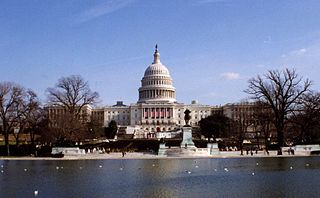
Barbara Pierce Bush was the first lady of the United States from 1989 to 1993 as the wife of President George H. W. Bush, and the founder of the Barbara Bush Foundation for Family Literacy. She previously was the second lady of the United States from 1981 to 1989. Among her six children are George W. Bush, the 43rd president of the United States, and Jeb Bush, the 43rd governor of Florida. She and Abigail Adams are the only two women to be married to one U.S. president and the mother of another.
The Committee for the Liberation of Iraq (CLI) was a non-governmental organization which described itself as a "distinguished group of Americans" who wanted to "free Iraq from Saddam Hussein".

The Bush family is an American dynastic family that is prominent in the fields of American politics, news, sports, entertainment, and business.

The 108th United States Congress was a meeting of the legislative branch of the United States federal government, composed of the United States Senate and the United States House of Representatives from January 3, 2003 to January 3, 2005, during the third and fourth years of George W. Bush's presidency.

The 103rd United States Congress was a meeting of the legislative branch of the United States federal government, composed of the United States Senate and the United States House of Representatives. It met in Washington, D.C. from January 3, 1993, to January 3, 1995, during the final weeks of George H. W. Bush's presidency and the first two years of Bill Clinton's presidency. The apportionment of seats in the House of Representatives was based on the Twenty-first Census of the United States in 1990.

The 1996 National Convention of the Republican Party of the United States convened at the San Diego Convention Center (SDCC) in San Diego, California, from August 12 to August 15, 1996. The convention nominated former Senator Bob Dole from Kansas, for president and former Representative and secretary of Housing and Urban Development Jack Kemp, from suburban Buffalo, New York, for vice president.

The 2000 National Convention of the Republican Party of the United States convened at the First Union Center in Philadelphia, Pennsylvania, from July 31 to August 3, 2000. The 2000 delegates assembled at the convention nominated Texas Governor George W. Bush for president and former U.S. Secretary of Defense Richard B. "Dick" Cheney for vice president.

The 109th United States Congress was a meeting of the legislative branch of the United States federal government, composed of the United States Senate and the United States House of Representatives, from January 3, 2005 to January 3, 2007, during the fifth and sixth years of George W. Bush's presidency. House members were elected in the 2004 elections on November 2, 2004. Senators were elected in three classes in the 2000 elections on November 7, 2000, 2002 elections on November 5, 2002, or 2004 elections on November 2, 2004. The apportionment of seats in the House of Representatives was based on the Twenty-second Census of the United States in 2000.

The "Draft Condi"movement was a grassroots effort to draft United States Secretary of State Condoleezza Rice to run for President of the United States in the 2008 U.S. election.

The Iraq Study Group (ISG) also known as the Baker-Hamilton Commission was a ten-person bipartisan panel appointed on March 15, 2006, by the United States Congress, that was charged with assessing the situation in Iraq and the US-led Iraq War and making policy recommendations. The panel was led by former Secretary of State James Baker and former Democratic congressman from Indiana, Lee H. Hamilton and was first proposed by Virginia Republican Representative Frank Wolf.

The Massachusetts Democratic Party (MassDems) is the affiliate of the Democratic Party in the Commonwealth of Massachusetts. It is chaired by Gus Bickford and is the state's dominant political party, controlling the entire congressional delegation and veto-proof supermajorities in the state legislature.

The United States Secret Service uses code names for U.S. presidents, first ladies, and other prominent persons and locations. The use of such names was originally for security purposes and dates to a time when sensitive electronic communications were not routinely encrypted; today, the names simply serve for purposes of brevity, clarity, and tradition. The Secret Service does not choose these names, however. The White House Communications Agency maintains a list that candidates choose from, often choosing ones that resonate with them personally.
Membership in the Council on Foreign Relations comes in two types: Individual; and Corporate. Individual memberships are further subdivided into two types: Life Membership; and Term Membership, which is for a single period of five years and is available to those between the ages of 30 and 36 at the time of their application. Only U.S. citizens and permanent residents who have applied for U.S. citizenship are eligible. A candidate for life membership must be nominated in writing by one Council member and seconded by a minimum of three others.

On April 22, 1994, Richard Milhous Nixon, the 37th president of the United States, died after suffering a stroke four days earlier, at the age of 81, which causes to brain damage and cerebral edema.

Jeanne L. Phillips is an American businesswoman and diplomat. She served as United States Ambassador to the Organisation for Economic Co-operation and Development from 2001 to 2003, under President George W. Bush.

The Alfred M. Landon Lecture Series is a series of speeches on current public affairs, which is organized and hosted by Kansas State University in Manhattan, Kansas. It is named after Kansas politician Alf Landon, former Governor of Kansas and Republican presidential candidate. The first lecture in the series was given by Landon on December 13, 1966.

This article lists those who were potential candidates for the Republican nomination for Vice President of the United States in the 1988 election. Incumbent Vice President George H.W. Bush won the 1988 Republican nomination for President of the United States, and chose Indiana Senator Dan Quayle as his running mate. The selection of Quayle surprised many of Bush's closest advisers, who had expected Bush to pick a more well-known running mate. However, Bush adviser Roger Ailes helped convince Bush that Quayle would be able to effectively attack the Democratic presidential nominee, Michael Dukakis. Bush also liked Quayle's youth and felt that Quayle would make for a loyal vice president. The Bush-Quayle ticket ultimately defeated the Dukakis-Bentsen ticket in the 1988 election.














